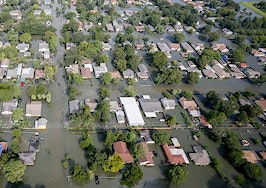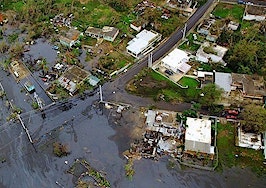As many as 311,000 coastal homes around the United States are at risk of suffering chronic flooding over the next 30 years, according to a new study by the Union of Concerned Scientists (UCS). By the end of the century, the study says as many as 2.4 million homes – worth nearly $1 trillion – could be at risk.
Despite the ominous rise of the sea, coastal properties aren’t losing significant market value yet, the report found using property value data from Zillow.
“What’s striking as we look along our coasts is that the significant risks of sea level rise to properties identified in our study often aren’t reflected in current home values in coastal real estate markets,” said Rachel Cleetus, an economist and policy director for the Climate and Energy Program at UCS, as well as a report co-author. “Unfortunately, in the years ahead many coastal communities will face declining property values as risk perceptions catch up with reality.”
There will be a stark difference between this coming crisis and past market crashes, where property values dropped dramatically. As proven by this current boom in prices, the market recovered in those cases.
“Values of properties chronically inundated due to sea level rise are unlikely to recover and will only continue to go further underwater, literally and figuratively,” Cleetus added.
Eroding property values will eventually translate into unlivable homes and ultimately, failing tax revenues – which help fund schools, roads and emergency services, according to the report. The properties at risk in the next 30 years represent roughly 550,000 people that contribute $1.5 billion to today’s property tax base. When you factor in business tax loss, the potential hits could be “staggering,” the report says.
“Some smaller, more rural communities may see 30, 50, or even 70 percent of their property tax revenue at risk due to the number of chronically inundated homes,” said Kristy Dahl, senior climate scientist at UCS and report co-author. “Tax base erosion could create particular challenges for communities already struggling with high poverty rates.”
While affluent homeowners stand to lost more wealth – due to simply having higher property values – low-income individuals stand to lose more of what they own, according to the report. And areas with low income individuals will have a harder time preventing or recovering from catastrophic flooding, the report adds.
“Homes often represent a larger share of total assets for elderly or low-income residents,” said Cleetus. Renters too might find themselves in a tight market or having to put up with decaying buildings and increased nuisance flooding. Hits to the property tax base in low-income communities, which already experience significant underinvestment in critical services and infrastructure, could prove especially challenging.”
In Florida, more than 1 million homes – which represents greater than 10 percent of properties – are at risk by the end of the century. In New Jersey and New York – two states walloped by Hurricane Sandy – a 250,000 and 143,000 homes are at risk, respectively. Municipalities in Florida could stand to lose $5 billion in annual property tax revenue.
Communities that could be hit the hardest by loss of property tax revenue are located in: Louisiana, Maryland, New Jersey, and North Carolina, according to the report. Communities with large African American or Hispanic populations – many located in California, Florida, Louisiana, New Jersey, New York, South Carolina and Texas – could also face greater hardships due to longstanding social and economic inequalities that could prevent speedy recovery from chronic flooding.
The loss of coastal properties will have a total negative impact on the United States economy, potentially triggering regional housing market crises or a more widespread economic crisis, the report also states. Homeowners with chronic flooding could find themselves underwater on their mortgage or defaulting on loans and that could hurt large lenders and smaller banks too.
Flawed policies – including include inaccurate flood risk information, subsidized insurance, lax zoning and building codes, incentives for business-as-usual building and re-building, and incomplete credit ratings – need to be addressed before even more people and property are exposed to risk, according to the report.
“Targeting improvements to the policies and market drivers of risky coastal development is essential to better protect communities and move the nation toward greater resilience,” said Shana Udvardy, climate resilience analyst at UCS and report co-author. “Short-sighted policies and market drivers will need to be phased-out to discourage risky behavior and to ensure changes won’t be too jarring on homeowners and the real estate market.”












